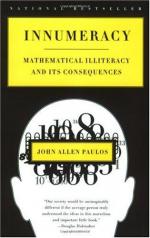
|
| Name: _________________________ | Period: ___________________ |
This test consists of 5 short answer questions, 10 short essay questions, and 1 (of 3) essay topics.
Short Answer Questions
1. Who was a giant in psychiatry?
2. In what year was the discovery made?
3. Where was the inventor from?
4. What is one of the most misunderstood items according to Paulos?
5. What item in the stadium is used as an example?
Short Essay Questions
1. Who was the mathematician responsible for discovering one of the most important discoveries?
2. Why do people tend to be fascinated by coincidences?
3. What do doctors often do that is mathematically incorrect?
4. Why does Paulos argue about the existence of coincidences?
5. How would embracing scientific notation help people with large numbers?
6. Which famous doctor does Paulos introduce first? What is the doctor's opinion?
7. How was the situation in the story handled? How did it involve probability?
8. How does Paulos compare misuse of language to the misuse of calculating probability?
9. What is the coincidence surrounding Christopher Columbus?
10. What is the example used to separate numerates from innumerates?
Essay Topics
Write an essay for ONE of the following topics:
Essay Topic 1
Paulos uses several famous doctors and scientists to prove his points regarding probabilities and coincidences. Explain Paulos' comments and reasoning. Which topics are addressed? What is the difference between probability, coincidence, irony, and synchronicity? Explain each and compare and contrast.
Essay Topic 2
Winning streaks are a big topic in regards to probabilities. What are Paulos' explanations regarding winning streaks? Which examples are used? Do you agree or disagree with Paulos? Explain. Use at least five examples of unnoticed winning or losing streaks compared to public perception and the correlation to mathematical principles.
Essay Topic 3
Paulos takes issue with the lack of proper focus on the skill of estimation. Examine Paulos' reasoning about the importance of estimation. In your eyes, is estimating an important skill? Explain. What can be gained by making estimations? How do you know when your sample group is large enough? Is it determined by the activity or question or are all sample groups the same size? What are the most common mistakes made when estimating? Can you prove the answer arrived upon is correct or incorrect? How? Create at least five examples of estimation as they might be found in every day situations.
|
This section contains 604 words (approx. 3 pages at 300 words per page) |

|




